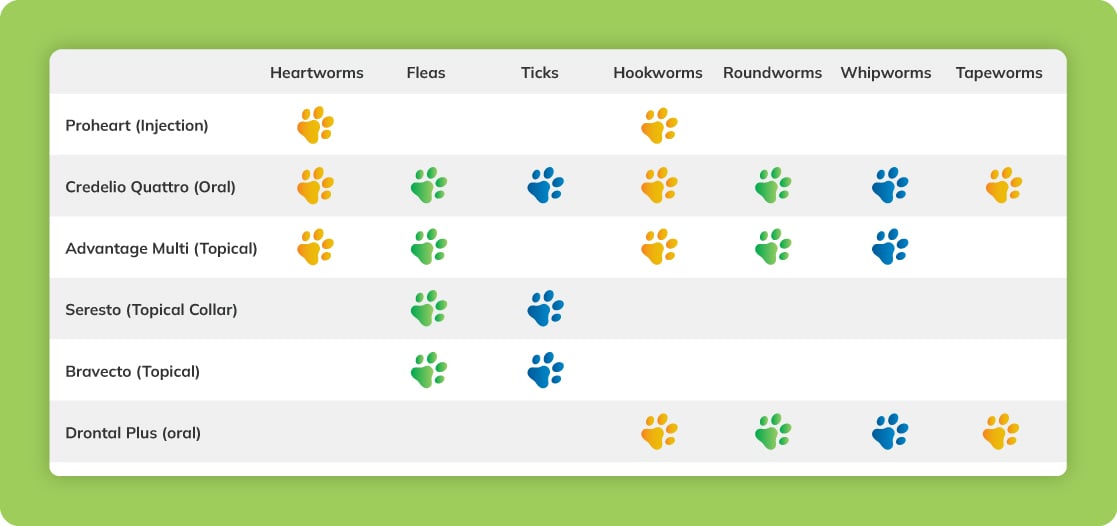Flea & Tick Prevention
If your pet has visited us within the last year and we have an up-to-date weight on file, you can conveniently purchase flea and tick medication through our online pharmacy.
Heartworm Prevention
Additionally, if we have completed a heartworm test in the last 6 months, you can also acquire heartworm prevention through our online pharmacy.
If your pet hasn’t received care from us in the past year, and we do not have updated weight or heartworm test records, you must schedule an appointment through our wellness department.
ProHeart6 Injection + HWT – $50
(up to 20lbs)
ProHeart6 Injection + HWT – $65
(20.1-40lbs)
ProHeart6 Injection + HWT – $80
(40.1-60lbs)
ProHeart6 Injection + HWT – $90
(60.1-80lbs)
ProHeart6 Injection + HWT – $105
(80.1-100lbs)
ProHeart12 Injection + HWT – $135
(up to 50lbs)
ProHeart12 Injection + HWT – $185
(50.1 – 90lbs)
ProHeart12 Injection + HWT – $210
(90.1+ lbs)
Bravecto – $40
(3 Months)
Bravecto – $80
(6 Months)
Bravecto – $190
(12 Months)
Credelio Quattro – $25
(1 Month)
Credelio Quattro – $125
(3 Months)
Credelio Quattro – $250
(6 Months)
Advantage Multi – $25
(1 Month)
Advantage Multi – $150
(6 Months)
Buy 5, get 1 free!
Advantage Multi – $300
(12 Months)
Buy 10, get 2 free!
Seresto Collars – $65
(Small Dog)
Seresto Collars – $65
(Large Dog)

Advantage Multi – $25
(1 Month)
Advantage Multi – $150
(6 Months)
Advantage Multi – $300
(12 Months)
Revolution Plus – $30
(1 Month)
Revolution Plus – $180
(6 Months)
Revolution Plus – $360
(12 Months)
Seresto Collars – $65


They aren’t just a bothersome pest that can cause itching and irritation on your pets or you. They also pose a risk to your health and that of your pet. When they attach themselves to a host (you or your pet) they suck blood and can transmit a number of diseases.
Although winter weather reduces the risk, a few days of warm weather over the winter months can make them active again. For this reason, year-round prevention is recommended in Kansas City.
PRCKC has a number of options to help you protect your pet from parasites. Check out our vaccination packages to learn more about what we offer.
Heartworms are internal parasites that infest an animal’s heart and vascular system. Their larvae enter your pet’s bloodstream through the bite of a common mosquito that previously bit a heartworm-positive dog. Those larvae then travel to the heart, grow into adults, and will begin to reproduce. If left untreated, heartworms are fatal.
They are most commonly seen in dogs, but can also be transmitted to cats. Only mosquitoes can transmit heartworms, so infection cannot pass between animals (dog-to-dog or dog-to-cat). People can become infected with heartworms by mosquitoes but it is very rare.
Lethargy, shortness of breath, coughing, and nosebleeds are all symptoms. Tragically, visible symptoms of heartworm infestation often don’t show for several months. This is why prevention is so important. Diagnosis of heartworm disease is typically done through blood tests. Cats are not routinely tested for heartworms because there is no definitive test or treatment for it.